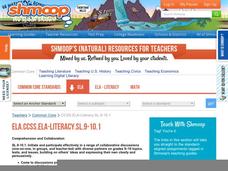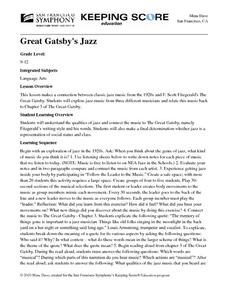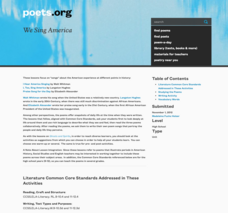Alberta Learning
Great City-states of the Renaissance
Acting as journalists on a team to determine the most influential city-state of Renaissance Italy, your young historians will research, discuss, and compare the rise of Venice, Florence, and Genoa, and their influence in shaping a...
American Documentary
Religion in Culture & Politics: Women’s empowerment in Syria
What defines a woman as empowered, and how does this definition compare to the ideas and actions of a group of Muslim women in Syria? After watching a series of video clips from a documentary film about a school for girls in Damascus,...
The New York Times
Looking for Answers: Making Sense of the Boston Marathon Bombing
How should America respond to acts of domestic terrorism? What motivates or prompts a terrorist attack? After reading an opinion piece on the 2013 Boston Marathon bombing, your learners will critically analyze factors that could have...
Curated OER
The Poetry Archive
Listening to poems about feeling lonely and feeling like an outsider set the stage for a group activity that focuses on Stevie Smith's "Not Waving But Drowning." Groups examine the three stanzas of Smith's poem separately and identify in...
Teach With Movies
Learning Guide to: Schindler's List
Take your history class through Schindler's List with a learning guide, which offers an introduction to the film and a variety of discussion questions and related assignments. There are several useful resources in the sidebar, such as a...
Appalachian State University
Glory: Motion Picture Study Guide
This is an excellent resource for teachers to use for incorporating the motion picture Glory into the classroom! Breaking down the film into particular noteworthy and telling scenes, the guide offers important considerations for each...
The New York Times
Kiev in Chaos: Teaching About the Crisis in Ukraine
Provide a historical context for the political unrest between Russia and Ukraine that began in late 2013. Learners review their prior knowledge and chronicle new understandings with a KWL chart, watch a video explaining the Ukrainian...
Pulitzer Center
Peacebuilding: Taking Home Lessons Learned in Africa
Learners take a closer look at one journalist's work on UN Peacebuilding efforts in four African nations: Sierra Leone, Burundi, Central African Republic, and Guinea Bissau. They collaborate to define peacebuilding and discuss the...
Pulitzer Center
International Aid and Fragile States
"States suffering from internal conflict, weak infrastructures, lack of economic development, and general instability are emerging as a large threat to the international security." What factors contribute to the creation of a fragile...
Curated OER
Challenging Stereotypes: A New Look at Old Age
Combine a lesson on the elderly with grammar instruction. Before viewing a series of provided video clips, class members brainstorm a list of words related to senior citizens and organize these words into categories that correspond with...
PBS
An Attack on Syria- What Would You Do?
Has United States military intervention in the conflicts of other countries always been warranted? After reviewing a brief background on contemporary US conflicts and reading articles describing the civil war in Syria, your learners...
Scholastic
Selecting Favorite Poems From Historical Poets
Here is a poetry lesson that begins with a free-association activity focused on the word voice. Learners each sit alone for a moment and make sounds that express how they are currently feeling, and then turn to their partners to share...
Scholastic
Writing Letters to the Chancellors of the Academy of American Poets
To celebrate National Poetry Month, young writers focus on the role letter writing has played in the development of poets. They begin by journaling three to five associations to a writing prompt that requires them to identify their...
Scholastic
Reading Poems From the Academy of American Poets Chancellors
Start a lesson on poetic voice with a peer to peer discussion on what characterizes the strength in the voice with which a writer chooses to express himself/herself. In pairs, readers are tasked with reading and creating T-charts for...
Shmoop
ELA.CCSS.ELA-Literacy.SL.9-10.1
Translate the first speaking and listening standard for yourself and your ninth and tenth graders! Learners can focus on communicating in small groups with the two activities presented here. Both activities center around group creation...
Shakespeare Uncovered
Merely Players
“. . . one man in his time plays many parts,/His acts being seven ages.” Jaques famous speech from Act II, scene vii of As you Like It sets the stage for an examination of the roles people play. Class members not only consider the roles...
Southern Nevada Regional Professional Development Program
Focus: The Paideia Seminar
Compelling discussions are the result of open-ended, challenging questions. An introduction to Paideia discussions includes explicit directions about how to prepare readers and how to model the kinds of questions they should develop in...
Curated OER
Great Gatsby's Jazz
As Nick wanders the grounds of Gatsby's mansion, he observes the behaviors of the rowdy guests and listens to the music pouring over the lawn. Bring the music of the jazz age into the classroom with Louis Armstrong's "West End Blues,"...
Curated OER
Letters to Poets
Add a strong poetry lesson to your literature unit. Middle and high schoolers investigate their writing voices with journaling and group discussion, then choose a famous poet to study. They write letters to their chosen poets, explaining...
Japan Society
Changing Times, Changing Styles: New Japanese Literary Styles of the Late Nineteenth Century
Focusing on Doppo's "Unforgettable People" and late nineteenth century Japanese literature, this resource also leads to discussions of form being dictated by content. Explore the development of new literary styles first-hand by...
Japan Society
Nature and the Environment in Postwar Japan
Japan has a complex relationship with the environment. Explore this relationship with your class through this resource. Included are thought questions, several activity ideas that range from writing, to discussion, to research, and an...
Academy of American Poets
We Sing America
Pair the famous poems "I Hear America Singing," by Walt Whitman, and "I, Too, Sing America," by Langston Hughes, with a more recent poem by Elizabeth Alexander called "Praise Song for the Day" to demonstrate a theme and introduce your...
Curated OER
From Light to Dark and Back
Experiment with light and dark in a series of interactive activities that lead up to reading and writing poetry. Class members have the opportunity to observe their feelings while sitting in the light and dark and to play with shadow...
Curated OER
Structure of Natural Narratives
Class pairs select a prompt from a provided list and tell (and record) their story to their partner. They then examine linguist William Labov's model for natural narratives, and apply his model to their tale. Next, class members watch...

























